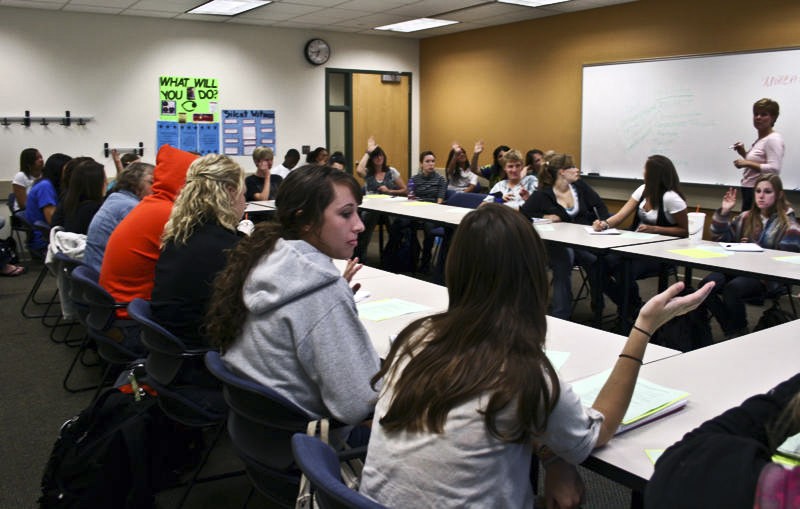Event raises awareness of LGBT domestic violence

Speaker Vicki Makley addresses student at the Behind Closed Doors event
Oct 3, 2010
When the topic of domestic violence is discussed, the focus is often on heterosexual relationships, but the violence in the lesbian, gay, bisexual and transgender community is discussed as frequently.
The Grand Valley State University Women’s Center, along with the LGBT Resource Center and the Counseling & Career Development Center, held a program called “Behind Closed Doors: Domestic/Dating Violence in LGBT Relationships” Wednesday that discussed healthy relationships and domestic violence in both heterosexual and LGBT communities.
Rachel DeWitt, a GVSU graduate assistant in the Women’s Center, said the program is centered on raising awareness.
“We want to start a dialogue on campus about these issues,” she said. “It seems to be an area where there’s not been a lot of discussion, not a lot of research and we want to start that conversation here at Grand Valley.”
DeWitt said she hopes students can take what they learn and use it to help.
“Even if it doesn’t seem relevant to their own situation, it’s really important to know how to help friends in this situation and to raise their awareness and show their support of people in abusive LGBT relationships,” she said.
“Behind Closed Doors” featured four speakers, which included Pam Miller from the Counseling & Career Development Center, Vicki Makley from the Women’s Center and Counseling Center, Tim Heacock from the LGBT Resource Center and DeWitt.
Miller and Makley discussed the characteristics of healthy and unhealthy relationships with attendees.
Students said some things in a healthy relationship include respect, honesty, trust and understanding and in unhealthy relationships there is selfishness, manipulation, anger and jealousy.
Miller said that many people find it difficult to be completely honest for fear of hurting their partner.
Makley talked about “fair fighting” and said it should be respectful, focused on the current issue and balanced in order to bring compromise. Sometimes this may involve taking time to cool off, she said.
“It’s ok to take a time out and say ‘Let’s just agree to disagree’ and go to bed,” she said.
DeWitt covered the cycle of domestic violence in relationships and how it occurs in both heterosexual and LGBT relationships.
“It is definitely an epidemic,” she said. “If there’s emotional abuse and verbal abuse it can result in physical abuse.”
Heacock discussed how getting help for LGBT abuse victims can be more problematic because of certain myths. A few myths are that abuse is mutual in same-sex relationships or that the abuser is always bigger or ‘more butch’ than the victim.
“(Heterosexual and LGBT) relationships are very much the same,” Heacock said. “They both have that power dynamic … and are often cyclical.”
There are also legal problems in LGBT relationships, Heacock said. Since same-sex relationships are not legally recognized in most of the U.S., topics of adoption and property become confused.
“Behind Closed Doors” was the first of a series of events for “Relationship Awareness Month.”

























